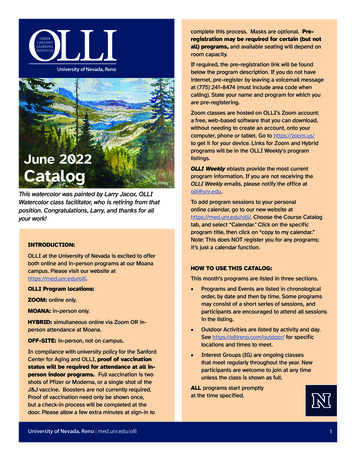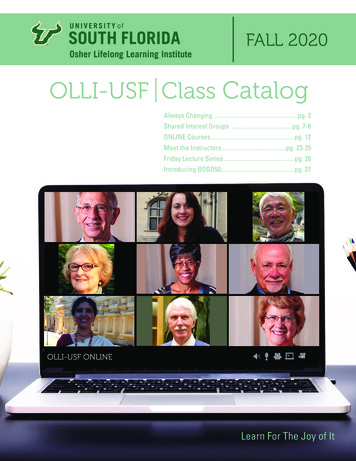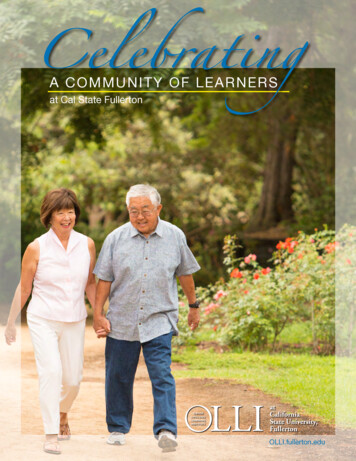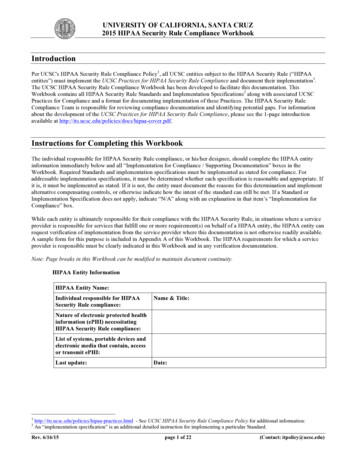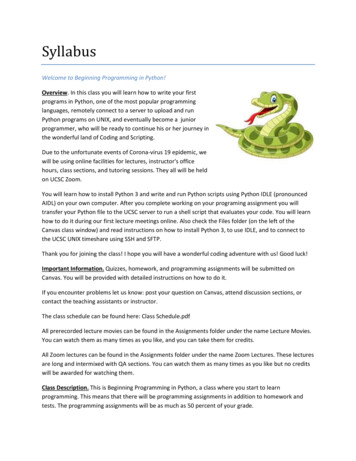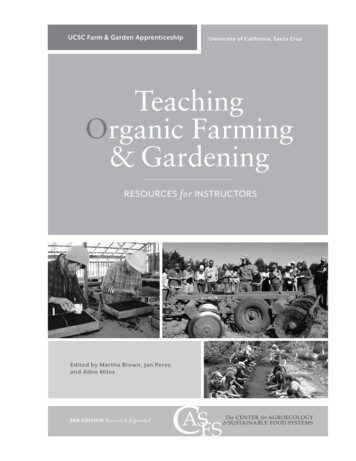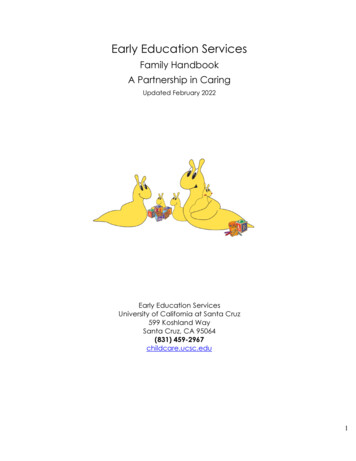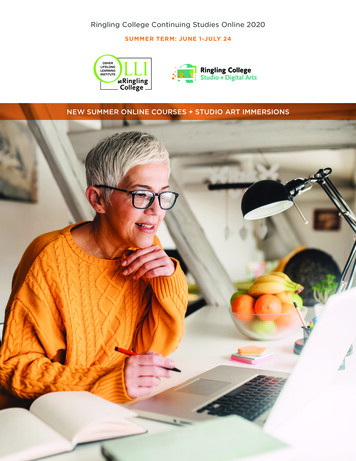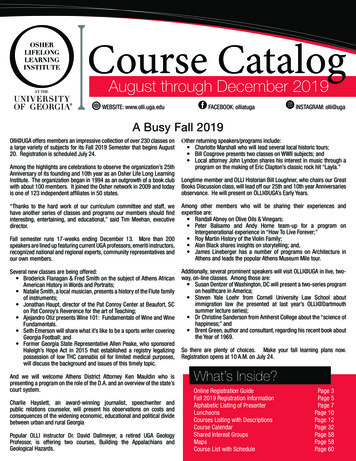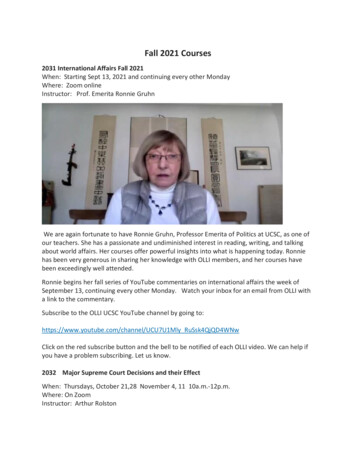
Transcription
Fall 2021 Courses2031 International Affairs Fall 2021When: Starting Sept 13, 2021 and continuing every other MondayWhere: Zoom onlineInstructor: Prof. Emerita Ronnie GruhnWe are again fortunate to have Ronnie Gruhn, Professor Emerita of Politics at UCSC, as one ofour teachers. She has a passionate and undiminished interest in reading, writing, and talkingabout world affairs. Her courses offer powerful insights into what is happening today. Ronniehas been very generous in sharing her knowledge with OLLI members, and her courses havebeen exceedingly well attended.Ronnie begins her fall series of YouTube commentaries on international affairs the week ofSeptember 13, continuing every other Monday. Watch your inbox for an email from OLLI witha link to the commentary.Subscribe to the OLLI UCSC YouTube channel by going to:https://www.youtube.com/channel/UCU7U1Mly RuSsk4QjQD4WNwClick on the red subscribe button and the bell to be notified of each OLLI video. We can help ifyou have a problem subscribing. Let us know.2032 Major Supreme Court Decisions and their EffectWhen: Thursdays, October 21,28 November 4, 11 10a.m.-12p.m.Where: On ZoomInstructor: Arthur Rolston
Some Supreme Court decisions are simply more important than others due to their impact onordinary Americans’ economic, social, cultural, and/or political lives. This is the second in aseries that looks at a number of cases decided over the course of American history and placesthem in historical context as both indicators and agents of cosmic changes in American life.Oct. 21: Citizens United v Federal Election Commission: Corporate Personhood, Money, andFree Speech,Oct. 28: Shelby County Alabama v. Holder: Deciding Who and How Americans Vote,Nov. 4: Religion and the Constitution and Burwell v Hobby Lobby Stores: One Person’s FreeExercise is Establishment to Another, andNov. 11: The “Problem” of Crime in a Free Society: The Nationalization of Criminal Procedure inthe 1960s.The first class on October 21st will look at the Citizens United case and issues of corporate“personhood,” free speech, and political power. Next, on October 28th we’ll use Shelby CountyAlabama v. Holder to focus on the history of voting rights and current trends. Then November4th the topic is religion and the Supreme Court, the conflict between the two religion clauses inthe First Amendment, and the Hobby Lobby case among others. For the final session onNovember 11ththe issue is crime, and how in the 1960s the Warren Court effectivelynationalized the basic standards of criminal procedure in a number of cases including Gideon vWainwright, Mapp v. Ohio, Miranda v Arizona and Furman v Georgia.While there’s no assigned reading, Google searches of the cases will lead to numerous links tothe Court’s majority and minority opinions.Arthur Rolston came to Santa Cruz from Los Angeles 2017. This will be his second time lecturingfor OLLI, having taught a four-lecture course on Constitutional history in spring 2020. He has aJD from (UC) Berkeley Law (1967), and a PhD in History from UCLA (2006). Prior to moving toSanta Cruz Arthur practiced law in Los Angeles for over 30 years and then taught history atUCLA as an adjunct lecturer from 2006-2016.2033 Behind the Scenes
When: November,3 Days to be AnnouncedWhere: On ZoomInstructors: Jill Steinberg, Wendy Harrison and Donna Baldini will co-facilitate the class."Behind the Scenes:" Let's talk about how COVID has affected us, what we did that helpedus, what we learned and might take away from our experience, and whatnext. Research/reading will be provided to inform our discussions. For example, did you knowthat the research shows that people over 60 have done the best going through COVID in termsof well-being?3 sessions: Coming in November, days/times to be announced soon.Class limited to 10 participants.Jill Steinberg, Wendy Harrison and Donna Baldini will co-facilitate the class.Jill has been facilitating Connection and Community Groups for OLLI and the University ofMichigan Ross Business School since COVID began. JIll is an Emeritus Professor, SJSU andfounder of MyRetirementWorks.com - From Retiring to Rewiring. Her chapter on retirementwas published this year in the Aging Consumer: Perspectives from Psychology andMarketing Eds, Drolet and Yoon, Publisher: Routledge.Contact Jill by email for questions and/or to sign-up. jillasteinberg@gmail.com2034 Modern Molecular Biology – Fall 2021When: Saturday Mornings, 10:30 - Noon, 6, 13, 20 November and 4, 11 December.Where: On ZoomInstructor: Barry Bowman
A typical animal cell contains more that 40,000 different kinds of molecules. In the past 25years great progress has been made in understanding how these molecules combine andinteract to form a living creature. UCSC has approximately 50 professors who directlaboratories that investigate some aspect of molecular biology.As in previous years Professor Emeritus Barry Bowman will organize the course and offer twolectures. Three other professors from UCSC will present lectures covering topics related to theirresearch programs.These talks are intended for a general audience. A scientific background or knowledge ofbiology is not expected. Barry Bowman, the course coordinator, will begin with a basic reviewof genes, proteins and cells.Lecture #1. Professor Emeritus Barry Bowman - Introduction to the Basics of Molecular BiologyLecture #2. Professor Upasna Sharma, Paternal dietary effects on offspring metabolism.Lecture #3. Professor Bowman – How do cells make themselves?Lecture #4. Professor Martha Zuniga - “You Really Got a Hold on Me – the Consequences of High AffinityBinding for Developing Autoreactive T Cells.”2035 The Expedition of Humphry Clinker (1771)When: October 12, 19, 26 10 a.m. to noonWhere: On ZoomInstructor: Bill ParkTobias Smollett’s Humphry Clinker ranks among the greatest of comic novels, admired by all itsreaders, including Charles Dickens and James Joyce.The book consists of letters from five members of the Bramble family touring Great Britain insearch of health. The accounts of their adventures and scenes visited provide not only aninterlocking drama but a superb portrait of England, Scotland, and Wales in the 1760s.There will be three two-hour (?) classes.Recommended is the Norton Critical Edition available from Amazon and Abebooks. Alsoavailable on Audible.First assignment: Volume I (pages 1-111).
Second assignment: Volume II (pages 112-214).Third assignment: Volume III (pages 215-323).Bill Park is an Emeritus Professor of Literature at Sarah Lawrence College, where he taught formany years. He received his PhD in Eighteenth Century English Literature from ColumbiaUniversity. He has written extensively about literature and film. We are fortunate that he hasmoved to Santa Cruz and is eager to share his knowledge with us. Our members who haveattended his classes were impressed by his encyclopedic knowledge of literature and film.Spring 2022 OLLI Courses2101 Food and BiochemistryTuesdays, Jan 11, 18, 25, Feb1, 8, 10:30 – 12:00 pm.Instructor: Barry BowmanThe food we eat is a complex mix of thousands of different kinds of chemicals. However, most of thesechemicals can be put into a few simple categories, e.g. fats, carbohydrates and proteins. In this coursewe will see how the human body uses these chemicals and converts them into living tissue or intoenergy. We will explore questions like “Why does fat have more calories than sugar, and what is acalorie”? What are vitamins and what do they do in our bodies? What is difference between LDL andHDL carriers of cholesterol?Participants are not expected to have a background in science. The content of the course will be largelythe same as in previous years, but those who wish to participate again are welcome. Although thecourse will be offered via Zoom, opportunities will be available for questions and discussion. BarryBowman is Professor Emeritus of Molecular, Cell and Developmental Biology at UCSC2102 MISSIONS TO OUR ORIGINSWhen; Wednesdays, February 16, 23, 10:30 to noonWhere; Zoom onlineInstructor: Roger KnackeThis course will review two recently launched space missions. LUCY is a spacecraft traveling to asteroidsin Jupiter"s orbit, which are believed to be pristine objects from the time when the Earth and SolarSystem formed. The James Webb Space Telescope will follow the Hubble Space Telescope and willobserve the first stars and galaxies to form in the Universe more than 13 billion years ago.Meetings:February 16: The LUCY Mission to the Trojan AsteroidsFebruary 23: The James Webb Space Telescope
Dr. Knacke is Emeritus Professor of Physics and Astronomy, Penn State, Erie, where he retired asDirector of the School of Science in 2010. His research focussed on interstellar matter and planetaryatmosphere. He has taught eight outstanding courses for OLLI.2103 SANTA CRUZ SHAKESPEAREWhen: Tuesdays, March 1, 8. 15. 22, 29, 10 a.m. to noonWhere: Zoom onlineInstructor: Michael WarrenMichael, a very knowledgable and entertaining Shakespeare scholar will discuss with us the two playsthat Santa Cruz Shakespeare will be presenting next Summer, Twelfth Night and The Tempest. Over theyears our members have found that taking this course greatly enhances their understanding andenjoyment of the plays.Professor Warren is Emeritus Profess of Literature at UCSC and Textual Consultant and Dramaturge toSanta Cruz Shakespeare.2105 Women's Lives in Late Antiquity and ByzantiumWhen: Thursdays, May 5, 12, 19, 26 10:30am to 12pmWhere: On ZoomInstructor: Maureen McGuireThrough a study of visual and material culture, this course will explore the lives of women in LateAntiquity and Byzantium, a period that roughly spans the 2nd century AC until the mid-15th century ACin the Eastern Mediterranean. We will examine different social, religious, and political attitudes towardwomen and gender, and their impact on women's roles in society as family members, caregivers,teachers, religious guides, laborers, and symbols of piety and power.Maureen is a graduate student at UCSC. She earned a BA and MA in art history. She researches thecultural patronage of Late Antique and Byzantine royal women.
2106 So, You Think You Know What the Universe is Made Of?When: Two Tuesdays, April 12, 19. 10:30 to noonWhere: Zoom OnlineInstructor: Bob Wilson“So you think you know what the universe is made of a series of two talks that address the historicalconcept of matter, and a sub-atomic example of a form of matter that might explain why the universecontains matter at all.Talk 1: What is mass – really? From Aristotle to HiggsIn this presentation, I will explore the concept of mass. I will begin with the familiar classical physicsnotions of substance and resistance to motion, move on to the fungibility of mass and energy inEinsteinian relatively, and end with the quantum picture of elementary particles gaining mass throughinteractions with an all-pervading Higgs field. And all with the barest minimum of equations.Talk 2: The Most Abundant Particle in the Universe is a ShapeshifterAway from the glare of city lights, a clear night skies affords a spectacular view of just a fraction of thebillion and billions of stars in the cosmos. Each one of those stars is pumping out unimaginable numbersof the most abundant known matter particle in the universe – the ghostly neutrino. In this talk I willintroduce you to this ubiquitous entity, including some of its more down-to-earth origins. I will alsodescribe how international teams of scientists are studying its shape-shifting quantum properties thatmight explain how the stars themselves (and us) came into being.Bob Wilson is a professor of experimental high energy physics and Professor Laureate of theCollege of Natural Sciences at Colorado State University. He earned his Bachelor of Sciencedegree in Mathematics and Physics at the University of London in England, and his Master ofScience and Doctor of Philosophy degrees in Physics from Purdue University, West Lafayette,Indiana. He received post-doctoral training at Stanford Linear Accelerator Center and held afaculty appointment at Boston University before moving back west to help establish a newresearch group at Colorado State University.He was chair of the governing institutional board for the Deep Underground Neutrino Experiment(DUNE) collaboration, with contributions from over 1200 scientists and engineers from 200 institutionsin 32 countries, and a member of the board of directors of the Sanford Underground Research Facility(SURF) in South Dakota that will host the massive DUNE far detector, as well as experiments searchingfor dark matter, an ion accelerator for the study of stellar processes, alongside geology and mining
projects. He is currently a board member of the SURF Foundation, which is developing an institute forunderground science, and is deputy leader of the ICARUS collaboration, led by Nobel laureate CarloRubbia, performing a neutrino experiment at the Fermi. National Accelerator Laboratory. He is a corecipient of the 2016 Breakthrough Prize for Fundamental Physics for his work in the T2K neutrinooscillation experiment collaboration based in Japan.2107 Latin American Art: Making and RemakingWhen: Thursdays, June 16, 23, 30, July 7 10:30 am to noonWhere: Zoom OnlineInstructor: Tatiane Schillaro Santa RosaCourse Description: This course looks at how visual culture and art in Latin America and theCaribbean have been part of on-going decolonial efforts and resistance from the 19th century tothe present. We will look at early modern art in Latin America, such as Mexican Muralism and theAnthropophagic Movement of Brazilian modernism. We will examine outcomes of the Post-WorldWar period in art historical discourses and how Latin American artists resisted dictatorships andstate violence. The course will highlight the importance of Latinx and Latin American artists, withfocus on Afro-Latina/o/es and Indigenous groups and their contributions to the realms of visualstudies.Bio: Tatiane Schilaro Santa Rosa is a Brazilian-born scholar, art writer, and independent curator. Shewas a 2018-19 Whitney Museum Independent Study Program fellow (Critical Studies), and is a Ph.D.Candidate in Visual Studies at the University of California Santa Cruz. She has curated shows at theAnya and Andrew Shiva Gallery (CUNY), The Mexic-Arte Museum (Austin, TX), A.I.R. Gallery, NARSFoundation, and SPRING/BREAK Art Show all in New York, at the Fundação Pró-Memória in SãoPaulo-Brazil, and at the ArteActual FLASCO in Quito, Ecuador. She graduated in 2015 with an MFAfrom the Art Writing Master’s Program at the School of Visual Arts, and has an MA in Art History,Contemporary Art from Sotheby’s Institute of Art. Her essays and reviews have been published byGuernica, The Brooklyn Rail, ARTNews, Artcritical, Hyperallergic, LatinxSpaces, and NewCityBrazil.
Her essay on artist Joiri Minaya appeared in “The Matter of Photography in the Americas”exhibition catalogue, published by Stanford Press, 2018. She has been a visiting faculty at the JohnJay College of Criminal Justice, the San Francisco Art Institute, and the University of California SantaCruz. From 2017-2020, she was AnnexB Residency's Creative Director and Curator.
interact to form a living creature. UCSC has approximately 50 professors who direct laboratories that investigate some aspect of molecular biology. As in previous years Professor Emeritus Barry Bowman will organize the course and offer two lectures. Three other professors from UCSC will present lectures covering topics related to their
